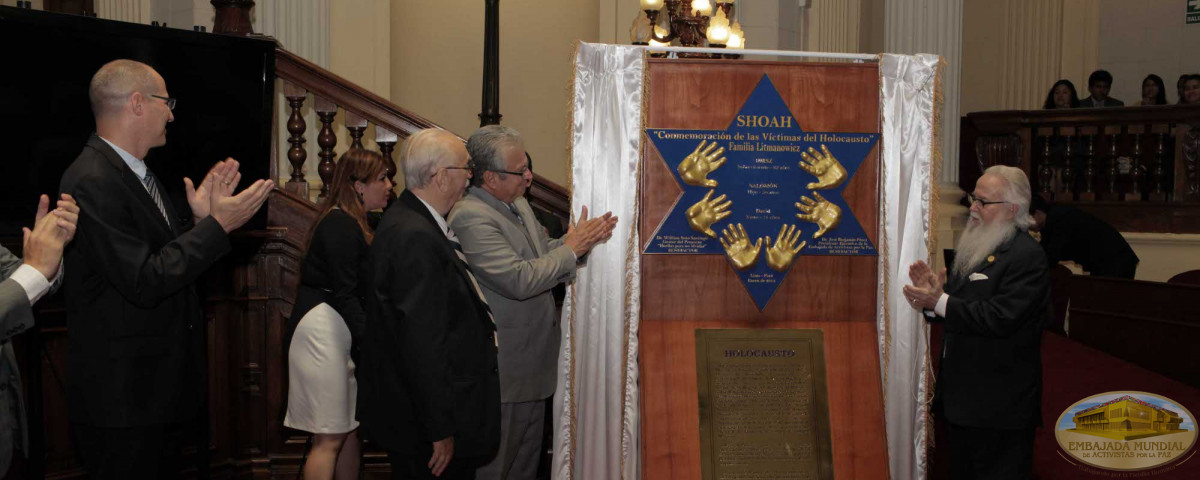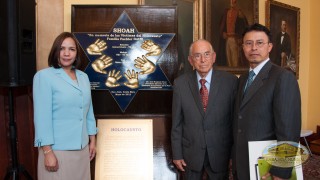Traces to Remember: The Congress of Peru Urges to Learn the Lessons of the Past to Ensure a Future based on Justice, Harmony and Equality
Tuesday, January 28, 2014 - Lima, Peru
Motivated by the commitment to promote and defend human rights, Peruvian government authorities, Holocaust survivors, peace activists, diplomatic corps accredited to Peru and members of the Jewish community gathered at the Congress of Peru to observe the International Day of Commemoration in memory of the victims of the Holocaust.
Panelists expressed to present generations words of remembrance and reflection, as well as urgency to never forget the Holocaust and instill the lessons of the Holocaust to future generations.
The Global Embassy of Activists for Peace introduced the project Traces to Remember in Peru with the unveiling of the commemorative plaque of Holocaust survivor Hirsz Litmanowicz, initiating a series of educational forums that will teach about the history of the Holocaust as the paradigm of genocide. The commemorative plaque of Holocaust survivors will also be exhibited at these activities.
Congressman Juan Castagnino Lema, President of the Peru-Israel Parliamentary Friendship Group reminded guests of the obligation we have to always remember the past in order to preserve the future:
“The Congress of the Republic of Peru and members of the Peru-Israel Parliamentary Friendship Group join this homage to the victims of the Holocaust, reaffirming our commitment to meet the challenges for justice, equality and human rights that we may face in the future.
Initiatives like the one that gathers us today, seek to teach the past in order to appease… to learn from the pain and suffering of people who are attacked because of their color, race, religion or creed, due to hatred and greed.
Now more than ever, we have the obligation to remember the past, learn from its lessons and apply them in the future, in order to ensure that the future of our people is based on justice, harmony and equality.”
Congresswoman Luisa Maria Cuculiza, member of the Peru-Israel Parliamentary Friendship League Group, shared her experience when she visited a concentration camp in Poland:
“What I felt when I visited the Auschwitz concentration camp was horrific; from the immense and profound pain experienced there, despite the time that had passed, the air felt full of suffering. When I was in front of the execution wall –believe me, I am a strong woman– but in that moment my body and my legs were shaking from the frightening sensation I felt being in front of that wall."
The Memories of Survivors
Holocaust survivor Esther Karl shared with the audience some of the painful experiences she suffered during the Nazi regime:
“Day and night the cattle trains ran, full of human beings: men, women and children, terrified of the unknown. All of them were traveling to their death without knowing it; the Auschwitz crematories awaited them, diabolically constructed for their extermination.
Parents were separated from their children and sent to the industrial chain of death. They had to calculate when to take out the corpses from the gas chambers and quickly fill them with the exact amount of newcomers to avoid wasting the gas calculated per person. Words are not enough to describe the horror of the gas chambers and the macabre medical experiments.”
Holocaust survivor Hirsz Litmanowicz, expressed that in Peru he was given the opportunity to start his life again and form a family:
“I was able to escape before the end came for me. I thank the Global Embassy of Activists for Peace for their work, for promoting the principles of love, life, respect and human dignity; and the message of tolerance, equality and liberty. I also would like to thank Peru for welcoming me with love and giving me the opportunity to grow as a person after the war. Sixty years have passed now, since I came to Peru.”
The Ambassador of the Global Embassy of Activists for Peace, Dr. William Soto, introduced the project Traces to Remember and urged authorities to promote the teachings left by the Holocaust for the human family:
“For many years, we have mistakenly thought and spread the idea that the Holocaust was a crime solely against the Jewish people. While the Holocaust made the entire Jewish people direct victims by seeking their extermination, it was also a crime against other groups and peoples. In reality, it was a crime against the human family.
This horrific act left universal lessons that we must teach in schools and universities as an effective tool to prevent and avoid the future commission of genocidal acts like these, that give rise to the evil, hatred and intolerance that a human being can express against his own kind.”
The United Nations
“All crimes are reprehensible, but when a crime is committed because of who the person is, rather than what he has done, the crime is even more reprehensible. For being Jewish, gypsy, homosexual, black or white… that is why the crimes committed in that time are more reprehensible, because they were aimed directly against who the person was. That is the reason for the United Nations, which, on behalf of all the entities in Peru, we are pleased to be a part of, and we are grateful for the opportunity to participate in this event, and in the project Traces to Remember,” said Christian Sanchez, National Information Officer for the United Nations in Peru."
Germany’s Position
Oliver Schramm, Minister Counselor of the German Embassy in Peru, stated how difficult it is for a German diplomat to discuss the subject of the Holocaust, and how important it is for their Government to develop activities that educate about this period of time in history:
“As you can imagine, and as I already mentioned last November at the 75th Anniversary of the ‘Night of the Broken Glass’: It is a difficult and challenging task for a German diplomat to recall the darkest stage of our history. However, it is one of the most important tasks that I can imagine: to contribute so that the greatest catastrophe of mankind, the Shoah, is not devalued or forgotten, and so that the European Jews, the victims of this Genocide do not disappear in our memories as if they were only numbers in the statistics of terror."
Israel Stresses the Need to Educate About the Holocaust
Yosi Aviram, Cultural, Commercial and International Cooperation Attaché at the Israeli Embassy in Peru, stressed that it is an obligation to tell future generations that atrocities like this should never be repeated, and he also mentioned the need to teach about the Holocaust:
“Although, there are still extremist organizations and regimes who say that the Holocaust never existed, it is important to call the attention of the world, and to understand that education has still not won the battle against anti-Semitism. The lessons left by the Holocaust will serve to continue in the fight against any kind of hatred and intolerance. How great it would be if the Holocaust were included into the curriculums of all the schools in the world, thus teaching our children about the true meaning of intolerance, racism and lack of morals.”
The event concluded with the presentation of the commemorative plaque containing the handprints of Holocaust survivor Hirsz Litmanowicz. The plaque will be exhibited at the Congress of Peru for one month.



